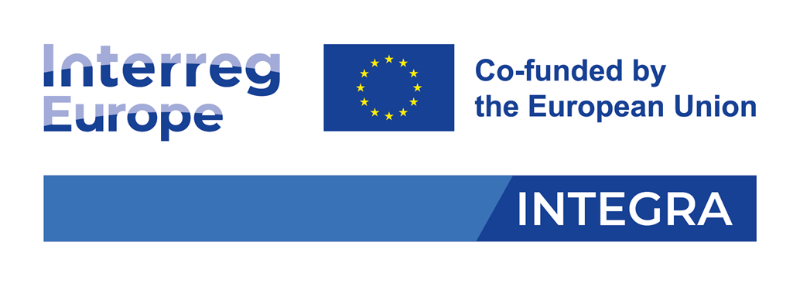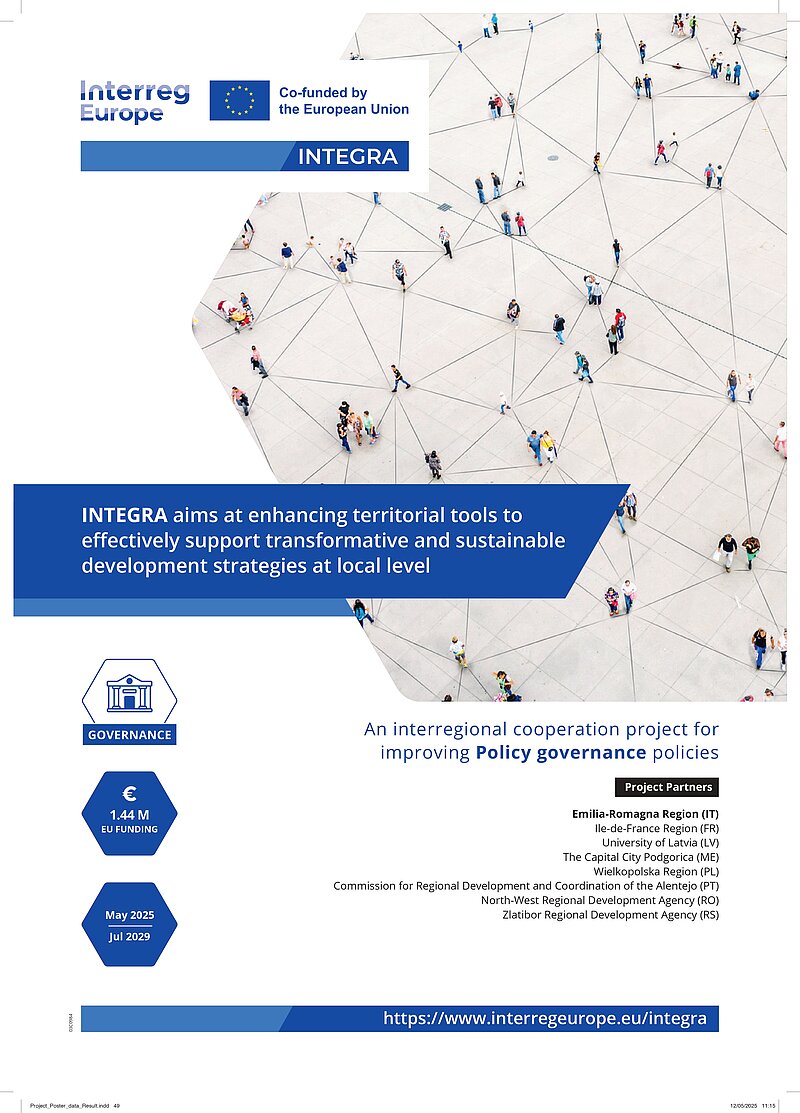INTEGRATED TERRITORIAL STRATEGIES FOR SUSTAINABLE TRANSITION

Programme: Interreg Europe
Project duration: May 2025 – April 2029 (Phase 1: 01.05.2025. – 30.04.2028, Phase 2: 01.05.2028. – 30.04.2029)
Funding: The project is co-financed by the European Regional Development Fund: 1,801,651.00 EUR (1,441,320.80 EUR - ERDF and 360,330.20 EUR - funds invested by partners).
Project goal
The INTEGRA project aims at building capacities to improve the design and management of territorial tools to enhance their untapped potential for the implementation of the triple transition (green, social and digital) at local level.
About project
Transition toward sustainable development, as envisioned by the UN Agenda 2030 and the EU Green Deal, calls for integrated place-based approaches to mobilise actors at all levels of government and to ensure fair transformation and a future for all regions. Territorial tools, within and beyond European Cohesion Policy, can play a role in this direction orienting action and investment to address local needs aligned with the European and global challenges and ensuring that the transition do not harm territorial cohesion.
In addition, there is recognised need to further improve current practices of planning and implementing territorial tools to make them more oriented to challenges, more transformative, and more impactful. INTEGRA addresses 8 policy instruments.
The project will be carried out by 8 project partners from 8 countries representing regions with different levels of development, different institutional settlements and different arrangements in territorial strategy making. Through complementary and integrated mutual learning and capacity building activities, the project will lead to policy improvement in the involved regions and more broadly to lessons useful for post-2027 programming cycle.
Partners
Project involves total of 8 partners from 8 countries:
- LP01 - Emilia-Romagna Region (Italy - Lead Partner)
- PP02 - North-West Regional Development Agency (Romania - Partner)
- PP03 - Ile-de-France Region (France - Partner)
- PP04 - Commission for Regional Development and Coordination of the Alentejo (Portugal - Partner)
- PP05 - University of Latvia (Latvia - Partner)
- PP06 - Zlatibor Regional Development Agency (Serbia - Partner)
- PP07 - Wielkopolska Region (Poland - Partner)
- PP08 - The Capital City Podgorica (Montenegro - Partner)
Associated policy authorities:
- Riga Planning Region (Latvia)
- City of Uzice (Serbia)
Within the INTEGRA | Interreg Europe project, the University of Latvia — through its Centre for European and Transition Studies (CETS) and Faculty of Economics and Social Sciences (FESS) — contributes expertise in regional development, governance, and territorial planning, working closely with the Riga Planning Region to strengthen integrated territorial strategies and sustainable growth.
In the Latvian context, Riga Planning Region Development Programme 2022-2027 will be tackled as a policy instrument. The Riga Planning Region Development Programme 2022-2027 (DP2027) is the medium-term territorial planning document which determines the region's development priorities, achievable goals and a set of measures for the implementation of the strategic objectives set out in the RPR Sustainable Development Strategy for 2014-2030.
More information:
Web: https://www.interregeurope.eu/integra
Facebook: https://www.facebook.com/integra.interregeurope/
LinkedIn: https://www.linkedin.com/company/integra-interreg-europe-project/
Contacts:
Ronalds Saksons, LU ESZF CETS, ronalds.saksons@lu.lv
Janis Zvirgzdins, LU ESZF CETS, janis.zvirgzdins@lu.lv
Integrētas teritoriālās stratēģijas ilgtspējīgai pārejai
Programa: Interreg Europe
Projekta īstenošanas periods: Pirmā fāze: 01.05.2025. – 30.04.2028. Otrā fāze: 01.05.2028. – 30.04.2029.
Finansējums: Projektu līdzfinansē Eiropas Reģionālās attīstības fonds. Projekta kopējais finansējums - 1,801,651.00 EUR (ERAF - 1,441,320.80 EUR; Partneru ieguldītie līdzekļi - 360,330.20).
Projekta mērķis
INTEGRA projekta mērķis ir stiprināt spējas uzlabot teritoriālo instrumentu izstrādi un pārvaldību, lai maksimāli izmantotu potenciālu trīskāršo pārmaiņu (zaļās, sociālās un digitālās) īstenošanai vietējā līmenī.
Informācija par projektu
Pāreja uz ilgtspējīgu attīstību, kā paredzēts ANO Ilgtspējīgas attīstības programmā 2030. gadam un ES Zaļajā kursā, prasa integrētas, uz teritorijām balstītas pieejas, lai mobilizētu dalībniekus visos valdības līmeņos un nodrošinātu taisnīgu pārveidi un nākotni visiem reģioniem. Teritoriālie instrumenti, gan Eiropas kohēzijas politikas ietvaros, gan ārpus tās, var būt nozīmīgi, virzot rīcību un investīcijas, lai risinātu vietēja līmeņa problēmas atbilstoši Eiropas un globālajiem izaicinājumiem un nodrošinātu, ka pāreja nekaitē teritoriālajai kohēzijai.
Turklāt ir identificēta nepieciešamība vēl vairāk uzlabot pašreizējo teritoriālo instrumentu plānošanas un ieviešanas praksi, lai tie būtu vairāk orientēti uz izaicinājumiem, pārveidojošāki un ar lielāku ietekmi. INTEGRA projekts skar 8 politikas instrumentus.
Projektu īstenos 8 projekta partneri no 8 valstīm, kas pārstāv reģionus ar atšķirīgu attīstības līmeni, dažādiem institucionāliem veidojumiem un atšķirīgām pieejām teritoriālo stratēģiju veidošanā. Izmantojot papildinošas un integrētas savstarpējas mācīšanās un spēju uzlabošanas aktivitātes, projekts vedīs pie politikas uzlabošanas iesaistītajos reģionos un pie atziņām, kas būs noderīgas plānošanas ciklam pēc 2027. gada.
Partneri
Projektā piedalās 8 partneri no 8 valstīm:
LP01 - Emīlijas-Romanjas reģions (Vadošais partneris - Itālija)
PP02 - Ziemeļrietumu Reģionālās attīstības aģentūra (Partneris - Rumānija)
PP03 - Ildefransas reģions (Partneris - Francija)
PP04 - Alentežu Reģionālās attīstības un koordinācijas komisija (Partneris - Portugāle)
PP05 – Latvijas Universitāte (Partneris - Latvija)
PP06 - Zlatiboras Reģionālās attīstības aģentūra (Partneris - Serbija)
PP07 - Lielpolijas reģions (Partneris - Polija)
PP08 - Podgoricas pilsēta (Partneris - Melnkalne)
Asociētie partneri - politikas veidotāji
- Rīgas plānošanas reģions (Latvija)
- Užices pilsēta (Serbija)
Interreg Europe projekta INTEGRA ietvaros LU Ekonomikas un sociālo zinātņu fakultātes (ESZF) Eiropas un sabiedrības attīstības studiju akadēmiskais centrs (EASAC) sniedz savu pieredzi reģionālās attīstības, pārvaldības un teritoriālās plānošanas jomā, cieši sadarbojoties ar Rīgas plānošanas reģionu, lai stiprinātu integrētas teritoriālās stratēģijas un ilgtspējīgu izaugsmi.
Latvijas kontekstā kā politikas instrumentu plānots pilnveidot Rīgas plānošanas reģiona Attīstības programmu 2022.–2027. gadam – vidēja termiņa teritoriālās plānošanas dokuments, kas nosaka reģiona attīstības prioritātes, sasniedzamos mērķus un pasākumu kopumu Rīgas plānošanas reģiona ilgtspējīgas attīstības stratēģijā 2014.–2030. gadam noteikto stratēģisko mērķu īstenošanai.
Vairāk par projektu:
Interneta vietne: https://www.interregeurope.eu/integra
Facebook: https://www.facebook.com/integra.interregeurope/
LinkedIn: https://www.linkedin.com/company/integra-interreg-europe-project/
Kontakti:
Ronalds Saksons, LU ESZF ESASAC, ronalds.saksons@lu.lv
Jānis Zvirgzdiņš, LU ESZF ESASAC, janis.zvirgzdins@lu.lv
NEWS - ZIŅAS

Titulfoto/ Photo by Martti Salmi on Unsplash

 CONFERENCE
CONFERENCE